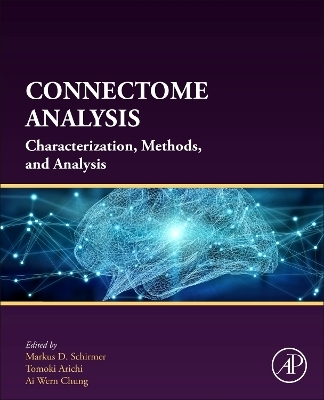
Connectome Analysis
Academic Press Inc (Verlag)
978-0-323-85280-7 (ISBN)
This book is aimed at students and early-career researchers in brain connectomics and neuroimaging who have a background in computer science, mathematics and physics, as well as more broadly to neuroscientists and psychologists who want to start incorporating connectomics into their research.
Dr. Markus D. Schirmer, PhD, is an instructor of investigation at Harvard Medical School (HMS) at the J. Philip Kistler Stroke Research Center, Department of Neurology, Massachusetts General Hospital (MGH), Boston. After his diploma in theoretical physics at Aachen University, he completed his PhD in biomedical engineering at King’s College London, where he focused on methodological connectome research in premature babies. In 2016 he started his postdoctoral fellowship at MGH/HMS, using connectomics and methodological approaches to study patients with stroke through clinical imaging data available in the emergency department. He continued his work as a Marie Sklodowska-Curie Global Fellow in 2017 at the German Center for Neurodegenerative Diseases in Bonn, Germany, MGH/HMS, and Massachusetts Institute of Technology, and while leading his own research group in the field of computational neuroradiology at the University Hospital Bonn (2020?22). Dr. Schirmer applies his methodological background combined with a focus on medical image analysis across the life span to improve our understanding of neurological diseases and the health outcomes, with a focus on bridging the gap between computational and clinical research. Dr. Tomoki Arichi, MBChB, FRCPCH, FHEA, PhD, is a reader in perinatal imaging at the Centre for the Developing Brain, School of Biomedical Engineering and Imaging Sciences at King’s College London; a group leader in the MRC Centre for Neurodevelopmental Disorders; and a visiting researcher in the Department of Bioengineering, Imperial College London. His research focuses on the development and application of advanced MRI techniques for studying the developing human brain. He is also a practicing clinician at the Evelina London Children’s Hospital, where his work as a consultant in pediatric Neurodisability focuses on the early identification and resulting management of the disabilities associated with perinatal brain injury and neurodevelopmental disorders. He graduated in medicine and surgery from the University of Birmingham in 2001 and obtained his PhD in imaging sciences as an MRC Chain Florey fellow at Imperial College London in 2012. Dr. Ai Wern Chung, PhD, is an instructor of pediatrics at Harvard Medical School and an associate scientific researcher at the Fetal-Neonatal Neuroimaging & Developmental Science Center, Boston Children’s Hospital. Her PhD in medical physics and neuroimaging was awarded from the Great Ormond Street Institute of Child Health, University College London, in 2014. She has held several neuroimaging research posts in hospital-affiliated institutes. These include the Stroke and Dementia Neuroimaging Unit at St. George’s University of London, and the Biostatistics Group at the Centre for the Developing Brain, King’s College London. Dr. Chung is a recipient of a joint American Heart Association and Children’s Heart Foundation Fellowship, and her research interest is in connectome markers of altered brain organization in relation to injury or pathology such as concussion, or congenital heart disease, towards improving well-being and outcomes throughout the life span.
Section I: Fundamentals of connectomics
Chapter 1 - Neurobiology and the connectome
Chapter 2 - Structural network construction using diffusion MRI
Chapter 3 - Functional network construction using functional MRI
Chapter 4 - Network nodes in the brain
Chapter 5 - Network measures and null models
Chapter 6 - Hubs and rich clubs
Chapter 7 - Community detection in network neuroscience
Chapter 8 - Network comparisons and their applications in connectomics
Section II: Advanced concepts and methods
Chapter 9 - Beyond the shortest path—diffusion-based routing strategies
Chapter 10 - Dynamic functional connectivity
Chapter 11 - The synergy of structural and functional connectivity
Chapter 12 - Machine learning in connectomics: from representation learning to model fitting
Chapter 13 - Deep learning with connectomes
Chapter 14 - Uncovering the genetics of the human connectome
Section III: Applications in the human brain
Chapter 15 - The developmental connectome
Chapter 16 - Connectomics in aging and cognition
Chapter 17 - Networks with lesions
Chapter 18 - Clinical application of connectomics to disorders of consciousness
Chapter 19 - Connectome analysis and psychiatric disorders
| Erscheinungsdatum | 10.07.2023 |
|---|---|
| Zusatzinfo | 115 illustrations (45 in full color); Illustrations |
| Verlagsort | Oxford |
| Sprache | englisch |
| Maße | 191 x 235 mm |
| Gewicht | 680 g |
| Themenwelt | Geisteswissenschaften ► Psychologie ► Allgemeine Psychologie |
| Geisteswissenschaften ► Psychologie ► Biopsychologie / Neurowissenschaften | |
| Geisteswissenschaften ► Psychologie ► Verhaltenstherapie | |
| Naturwissenschaften ► Biologie ► Humanbiologie | |
| Naturwissenschaften ► Biologie ► Zoologie | |
| ISBN-10 | 0-323-85280-7 / 0323852807 |
| ISBN-13 | 978-0-323-85280-7 / 9780323852807 |
| Zustand | Neuware |
| Informationen gemäß Produktsicherheitsverordnung (GPSR) | |
| Haben Sie eine Frage zum Produkt? |
aus dem Bereich


